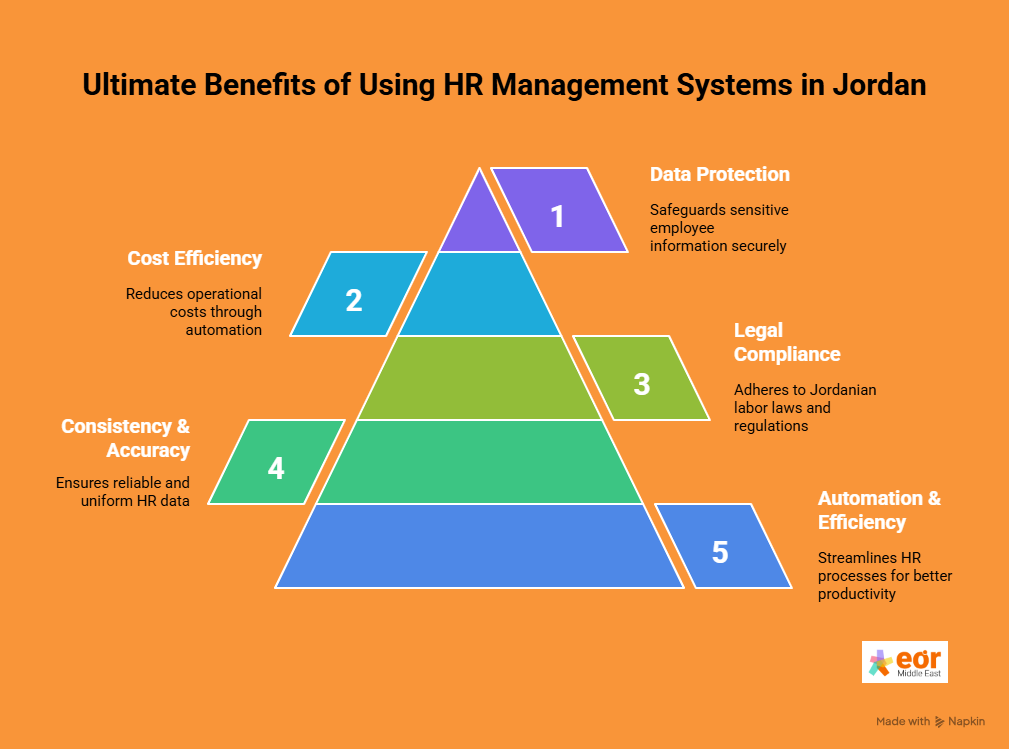In today’s fast-changing corporate scene, Jordanian companies realize that the critical need for effective HR management is to attain a competitive edge and long-term prosperity. Traditional manual HR systems typically prove insufficient as companies grow and the workforce is more dynamic, which causes inefficiencies, mistakes, and a stressed HR staff. Here is where HRM Systems show great value as they provide an automated and centralized method of handling the whole employee lifetime.
The HR management system is a software system designed to simplify and automate many HR tasks. Organizations may significantly increase operational efficiency and data quality, and promote their HR staff to concentrate on strategic objectives rather than administrative tasks by including basic HR procedures into one platform. As companies try to maximize staff management and follow worldwide best practices in worker management, HRMS adoption in Jordan is gathering steam.
Exploring exclusive features of HR management systems in Jordan
A complete HRMS consists of several tools to meet the multiple demands of contemporary HR departments. One may classify these characteristics generally as follows:
Management of core HR and staff information:
Any HR management system is essentially based on a centrally managed database for storing and controlling all employee-related data. It covers personal information, phone contacts, employment history, pay and benefits, efficiency records, training background, and other vital data. A well-organized database system guarantees simple access to details, data accuracy, and a basis for other HR procedures.
Application tracking and hiring:
The hiring module simplifies recruiting from job advertising and resume administration to applicant assessment, interviewing, and onboarding. An integrated applicant tracking system enables HR management staff to handle several applications effectively, quickly find suitable applicants, and enhance the candidate experience. Features often include automatic resume processing, interview organizing, tools for communication, and hiring managers’ cooperation capability.
Initial onboarding:
Engaging new employees and including them in the corporate culture and operations depends on a flawless and quick onboarding process. Often, including onboarding modules that automate the administrative chores related to bringing new workers on board, such as documentation, staff benefits, and initial training. HR management systems also speed up the new workers’ time to produce output and help make an excellent first impression.
Attendance and time tracking:
Payroll processing and compliance depend on the exact recording of staff working hours, presence, and leaves. Using several approaches, including in and out check-in systems, timesheets, and interface with actual attendance devices, HRMS with time and attendance capabilities automates this process. It reduces mistakes, removes hand data input, and offers a real-time staff attendance overview.
Staff leave management:
Dealing with sick days, staff vacation requests, and other absences may be difficult and time-consuming. Staff members may request leaves online using HRMS leave management systems, which direct such requests to the relevant supervisors for approval. The solution guarantees legal compliance with business leave policy and labor legislation, automatically changes leave balances, offers calendar views, and tracks staff absences.
Staff payroll administration:
Payroll processing is one of the most important HR tasks requiring accuracy and local rule compliance. HR management systems with integrated payroll modules automate compensation calculations, deductions, handling benefits, pay slips, and payroll report creation. It guarantees timely payments, lowers the possibility of mistakes, and helps one to comply with Jordanian labor laws and social security rules. Specific systems additionally include tools for handling allowances and deductions that are particular to the Jordanian situation.
Staff performance development:
Significant performers, areas for development, and matching individual ambitions with corporate objectives all depend on constant monitoring and evaluation of staff performance. Modules for an HR performance management system that track performance help with goal formulation, performance evaluations, feedback systems, and future growth planning. Customizable assessment templates, feedback in all directions, and tools for monitoring development versus objectives might be among the features.
Staff training and development system:
Boosting skills, raising performance, and creating a culture of ongoing development depend on investments in employee learning and development systems. Integrated LMS systems in specific HRMS packages let companies design, implement, and monitor staff training initiatives. These systems can handle distance learning, in-person instruction, certificates, and skill development programs.
Staff benefits management:
Keeping track of employee benefits like pension schemes, medical coverage, and other incentives may be a difficult administrative chore. HR management system for benefits handling guarantees reliable record-keeping, simplifies enrollment procedures, and provides staff members with self-service access to benefit information.
Staff self-service dashboards:
By allowing staff members to view and control their HR-related data online, an ESS portal helps the HR department to be less administratively loaded. Employees may check pay stubs, update personal information, ask for leave, read corporate rules, sign up for perks, and more via the site. It gives staff members more control over their data, improving their engagement and happiness.
Data analytics and performance reports:
HRMS systems’ strong reporting and analytics features help companies to better understand their worker data. Several HR metrics may be produced, including employee attrition, absenteeism, recruiting effectiveness, performance trends, standards, and bespoke reports. These revelations support HR management teams in determining areas for development, quantifying the results of HR projects, and guiding data-driven decisions.
Compliance with local regulations:
A major duty of the HR division is guaranteeing adherence to Jordanian labor laws, social security rules, and other legal criteria. Features of HRMS systems that enable companies to remain compliant by automating procedures, keeping correct data, and offering notifications for legislative changes abound. Features that fit local rules, including the computation of social security payments and respect of individual leave rights, are especially crucial for companies running in Jordan.
Ultimate Benefits of Using HR Management Systems in Jordan

Adoption of an HR management system can help Jordan’s companies to become more efficient, productive, and generally successful by employing better control of their operations:
Improved automation and efficiency:
Automating traditional HR management operations helps an HRMS significantly reduce the time and effort needed for administrative chores. It releases HR leaders to concentrate on more strategic projects, such as corporate strategy, staff engagement, and talent development.
Enhanced consistency and data accuracy:
Centralizing personnel data in one system can reduce the need for several spreadsheets and paper-based records, lowering the chance of mistakes and discrepancies. It guarantees that, when required, HR data is accurate, current, and easily accessible.
Ensure legal compliance:
HRMS systems enable companies to comply with Jordanian labor laws and regulations through process automation, reliable record-keeping, and regulatory change notifications. They guarantee follow-through to top standards and lower the possibility of legal fines.
Cost efficiency:
Although establishing an HR management system requires an initial outlay, the long-term savings may be substantial. Automation lowers administrative expenses, decreases mistakes, increases efficiency, and lessens the need for human labor, which it substitutes for.
Improved data protection:
Usually, modern HRMS systems have strong security mechanisms to guard private staff information. Ensuring the security and integrity of HR data, which includes encryption, access restrictions, and data privacy law compliance.
Implementing HR management systems in Jordan: Hazards and Obstacles
Although HRMS offers major advantages, Jordanian companies should also be aware of possible difficulties and factors to consider throughout the implementation process:
Safe data transfer:
Moving current staff data from outdated software or manual processes to a new HR management system may be a difficult and time-consuming task. The data transfer, data integrity, and rectifying errors must be secured and guaranteed.
Integration with existing software:
Companies may have to combine their HRMS with additional company systems, including accounting tools or ERP systems. Consistency of information and workflow effectiveness depend on smooth integration.
Effective change management:
Adopting a new HRMS requires modifying procedures and workflows, which can raise employee objections. Successful adoption depends critically on good change management techniques, including interactions, training, and partners’ involvement.
Personalization and tailored solutions:
Although many HRMS systems have various capabilities, Jordanian companies could have particular needs, such as local labor regulations, Arabic language support, and cultural sensitivity. One should choose a system that provides choices for localization and customization.
Expenditures and costs:
Particularly for small and medium-sized businesses, the expenses of running and maintaining an HRMS might be higher. Companies must ensure that the advantages exceed the costs by closely assessing the overall cost of ownership.
Assistance and support:
Maximizing the advantages of the new HR management system depends on providing enough training for staff members and workers on its use. Dealing with potential problems also depends on continuous technical help from the vendor.
Final words
HR performance management systems have become an increasingly important tool for Jordan’s companies looking to simplify their HR processes, boost effectiveness, and enhance the general employee experience.
Using data analytics, core HR process automation, and local regulatory compliance assurance, HRMS enables HR teams to concentrate on strategic initiatives driving corporate development by offering important insights and streamlining fundamental HR procedures. Although using an HRMS could provide some difficulties, companies in Jordan who want to maximize their workforce management strategies and attain lasting success in today’s competitive market would find it a worthy investment, given the long-term advantages of higher productivity, more accurate information, enhanced staff engagement, and compliance improvements.
HRMS systems will probably grow even more complex as technology develops, including advanced capabilities like AI-driven analytics and tailored employee experiences, thereby changing the landscape of HR management in Jordan.



